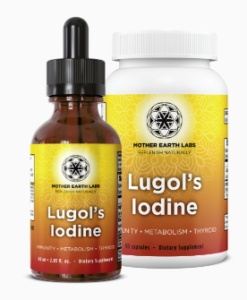Let’s start with this question: Why iodine at all? Because every single cell in the human body requires it. White blood cells, for example, need sufficient iodine to fight infection. Our thyroid, which is something of a “master gland,” needs it to regulate our metabolism; all thyroid hormones contain iodine. It is so crucial for brain development in children, its deficiency is cited as the #1 cause of preventable mental retardation worldwide. (Pregnancy exacerbates iodine deficiency, by the way.)
In ancient times, iodine washed into the sea and concentrated in seaweed. In the United States, we don’t eat much seaweed. But in Japan where they do, their lower cancer rates are often attributed to the sea vegetables in their diet. Sea vegetables like dulse seaweed, kelp, arame, kombu, nori, sea palm, and wakame are the richest source of iodine.

Compelling data are emerging that link iodine deficiency to breast cancers and high rates of fibrocystic breast disease. Iodine also has a long history as a natural therapy for hypertension and cardiovascular disease. Iodine deficiency can cause weight gain, low energy, depression, cardiovascular disease, cognitive decline, and more. Iodine embodies natural anti-viral, anti-biotic, anti-fungal and anti-septic properties which are key to a robust immune system, and that’s the body’s first line of defense against disease. This is why iodine is called the universal health nutrient.
“But I use iodized salt, that ought to do it,” you say. Nope. In the United States, iodine levels have fallen more than 50% since the 1970s. The FDA found many table salt makers now fail to add iodine in quantities sufficient to support the kinds of health issues talked about above. Plus, if you use iodized salt when cooking, it loses up to 60% of its iodine content.
You can work with your healthcare provider to access your iodine levels. Your doctor can do a 24-iodine loading test which gives insights as to your body’s ability to absorb and use iodine.
The Lugol’s iodine formula was devised by French physician Jean Lugol in the 1880s. It is a liquid solution of iodine (0.05 g/ml) and potassium iodide (0.100 g/ml). Iodide is preferred by the thyroid; iodine is preferred by the breast and prostate. SSKI and most other liquid iodine formulas do not have a correct balance of iodine and iodide, essential for easy body absorption.

Here is my source of Lugol’s, because they add some important co-factors to it. You order it online and they ship it to you. Click here
Go to the “Products” tab and read more about whether the liquid or capsules is a better choice for you.
